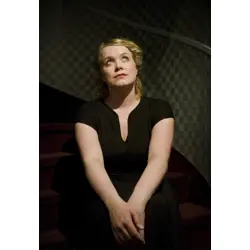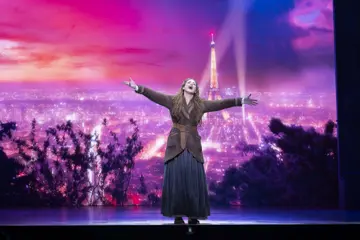 Ane Brun
Ane Brun"A lot of people, through the years, have been surprised that I'm a very social, happy person, because [my] music is so sad," says Ane Brun. The 40-year-old singer-songwriter is hugely successful in Norway, where she was born, and Sweden, where she's based. But, to the outside world, she's more of a cult act; listeners drawn to her sweet voice and sorrow-filled songs. "I remember an American journalist wrote that I was part of the Scandinavian suicide scene, which was really funny. My first albums are really, really sad. When I discovered music, it felt like I found a channel to put all the dark stuff in life into."
"I remember an American journalist wrote that I was part of the Scandinavian suicide scene, which was really funny."
Brun considers herself a "latecomer" to music. Growing up in small-town Molde, Norway — "a really beautiful place, in the fjords, with lots of mountaintops" — she was obsessed with sports, even though her mother was a music teacher. It was only her "very confused" approach to her education — moving from Oslo to Barcelona, Bergen, Uppsala and Stockholm; studying Spanish, history, law, cultural studies — that eventually led to her learning music improvisation and theory. By then, she was recording her debut LP, 2003's Spending Time With Morgan.
"When I released my first album, I just on my way to getting my degree as a... cultural academic something," Brun laughs. "I didn't foresee that music would be my work. Because I discovered it so late, music was like this precious treasure that I really had to guard, to protect. Gigs were so important, so serious. I remember another musician said to me, before we played a show, 'This is going to be so much fun!' And I was like, 'Fun?!' I couldn't relate at all."
Brun remembers "those first years" fondly. "When you write your first songs, do you first performances, [record] your first albums — it feels electric. It's almost like falling in love for the first time. Over time, it changes, like any relationship; your love becomes deeper, and wider, and there's more substance."
Don't miss a beat with our FREE daily newsletter
For her latest trip to Australia — following a 2014 set at WOMADelaide — Brun will be flying solo, and drawing from across her long-term relationship with music. "When I started playing, I played a lot on my own — this is going back to that," she says. "Just me, on guitar or piano, playing songs from throughout my career. I've always felt that all my songs should be as good when I play them on my own as they do any other way."
Her stripped-down shows come in support of an album, 2015's When I'm Free, that found Brun challenging that approach: its tunes discovered in the studio, its title reflecting the liberation she felt. "I felt like I had changed a lot of my restrictions, in both music and in life; had let go of a lot of fear," says Brun. "I went through this really hard period of illness before writing these songs, so there was a really clear image of going through this stormy weather, and coming out the other side."
















